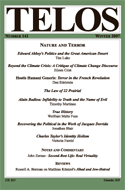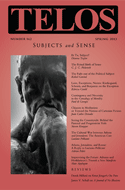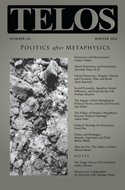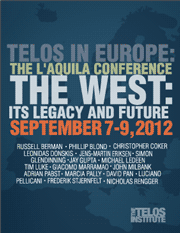By Robert Ramos · Friday, January 3, 2014 As an occasional feature on TELOSscope, we highlight a past Telos article whose critical insights continue to illuminate our thinking and challenge our assumptions. Today, Robert Ramos looks at Jonathan Blair’s’s “Context, Event, Politics: Recovering the Political in the Work of Jacques Derrida” from Telos 141 (Winter 2007).
 In “Context, Event, Politics: Recovering the Political in the Work of Jacques Derrida,” Jonathan Blair asks us to reconsider the standard narrative that has been used to categorize and also mischaracterize Derrida’s work. This is the position that Derrida’s early work begins with the institution of deconstruction and that at a point in the late 1980s Derrida’s thinking experienced a shift or a turn from deconstruction and to an explicit focus on the ethical and the political. Against this narrative, Blair argues that the question of politics appears as early as 1970. In “Context, Event, Politics: Recovering the Political in the Work of Jacques Derrida,” Jonathan Blair asks us to reconsider the standard narrative that has been used to categorize and also mischaracterize Derrida’s work. This is the position that Derrida’s early work begins with the institution of deconstruction and that at a point in the late 1980s Derrida’s thinking experienced a shift or a turn from deconstruction and to an explicit focus on the ethical and the political. Against this narrative, Blair argues that the question of politics appears as early as 1970.
Continue reading →
By Juan Carlos Donado · Thursday, April 18, 2013 Juan Carlos Donado’s “Chiasms in Meditation or Toward the Notion of Cartesian Fiction” appears in Telos 162 (Spring 2013). Read the full version online at the Telos Online website, or purchase a print copy of the issue in our store.
 In constant friction with readings that are either completely oblivious of the notion or merely mention the fictional aspect of Descartes’ Meditations, this essay attempts to philosophically thematize the concept of fiction, based on a now famous interpretation by Michel Foucault. We will attempt to make a robust case for constructing the concept of Cartesian fiction as a philosophically crucial category, which cannot be absent from an analysis that pretends to capture the thrust of Descartes’ writing in the Meditations. We will address how fiction plays a determining role in defining certain philosophical pillars of Cartesian thought, such as the concepts of radical doubt, truth, and the extension of rationality itself. We will closely read various key moments of Meditations I–II to illustrate why fiction can be viewed as the hermeneutical catalyst that unlocks the interpretation of certain “chiasms,” which Foucault well identified within the Meditations as the crossing between two discursive lines, that of the system and that of the exercise. At the same time and by the same token, the focus on the concept of fiction will serve to provide our own interpretation of the meditating subject’s encounter with madness, an encounter that spurred a heated debate between Foucault and Jacques Derrida. In constant friction with readings that are either completely oblivious of the notion or merely mention the fictional aspect of Descartes’ Meditations, this essay attempts to philosophically thematize the concept of fiction, based on a now famous interpretation by Michel Foucault. We will attempt to make a robust case for constructing the concept of Cartesian fiction as a philosophically crucial category, which cannot be absent from an analysis that pretends to capture the thrust of Descartes’ writing in the Meditations. We will address how fiction plays a determining role in defining certain philosophical pillars of Cartesian thought, such as the concepts of radical doubt, truth, and the extension of rationality itself. We will closely read various key moments of Meditations I–II to illustrate why fiction can be viewed as the hermeneutical catalyst that unlocks the interpretation of certain “chiasms,” which Foucault well identified within the Meditations as the crossing between two discursive lines, that of the system and that of the exercise. At the same time and by the same token, the focus on the concept of fiction will serve to provide our own interpretation of the meditating subject’s encounter with madness, an encounter that spurred a heated debate between Foucault and Jacques Derrida.
Continue reading →
By Michael Marder · Wednesday, February 13, 2013 Michael Marder’s “After the Fire: The Politics of Ashes” appears in Telos 161 (Winter 2012). Read the full version online at the Telos Online website, or purchase a print copy of the issue in our store.
 Two fires are kindled at the threshold of the metaphysical era, and both are extinguished, almost simultaneously, as soon as metaphysics exhausts itself (or else gets exhausted, tired, fatigued with itself) in its final Nietzschean inversion. The political reality of the twenty-first century is, as a whole, a comet tail of these ancient blazes that, until recently, seemed to be older than time itself, gave the impression of being eternal, undying, inextinguishable. How to find one’s bearings among the cinders and ashes of what the flames consumed? How to make sense—if make sense we must—of the burnt and smoldering remains, the traces of catastrophes, as much as of hopes and revolutionary desires, littering the horizons of the political today? Two fires are kindled at the threshold of the metaphysical era, and both are extinguished, almost simultaneously, as soon as metaphysics exhausts itself (or else gets exhausted, tired, fatigued with itself) in its final Nietzschean inversion. The political reality of the twenty-first century is, as a whole, a comet tail of these ancient blazes that, until recently, seemed to be older than time itself, gave the impression of being eternal, undying, inextinguishable. How to find one’s bearings among the cinders and ashes of what the flames consumed? How to make sense—if make sense we must—of the burnt and smoldering remains, the traces of catastrophes, as much as of hopes and revolutionary desires, littering the horizons of the political today?
Continue reading →
By Simon Glendinning · Monday, January 7, 2013 The following paper was presented at Telos in Europe: The L’Aquila Conference, held on September 7-9, 2012, in L’Aquila, Italy.
 How should we conceive the distinctive character, the “particular rarity,” of the wearing and growing of the contemporary world? How should we come to terms with our time? What words can we find that are fitting for its specificity when so many of the words we have found fitting hitherto, especially promising words about the course of human history and its political hopes, its hopes in the political (modernity, Enlightenment, civilization, socialism, etc.) sound more and more like the road signs of another age? How should we conceive the distinctive character, the “particular rarity,” of the wearing and growing of the contemporary world? How should we come to terms with our time? What words can we find that are fitting for its specificity when so many of the words we have found fitting hitherto, especially promising words about the course of human history and its political hopes, its hopes in the political (modernity, Enlightenment, civilization, socialism, etc.) sound more and more like the road signs of another age?
Are we not floundering today? Isn’t this, at least in part, what we need to understand, to make intelligible? So we might look out for writings, wherever they come from, that speak to and speak from this world, a world which today, it seems, more than ever, “wears as it grows.”
Continue reading →
By Paul Rekret · Thursday, January 3, 2013 Paul Rekret’s “The Impasse of Post-Metaphysical Political Theory: On Derrida and Foucault ” appears in Telos 161 (Winter 2012). Read the full version online at the Telos Online website, or purchase a print copy of the issue in our store.
 The debate between Jacques Derrida and Michel Foucault over the status of Descartes’ Meditations can be read to indicate some profound implications for the ways by which we conceive of a post-metaphysical political theory. This article documents the way in which the terms of the debate suggest that in conceiving politics after metaphysics in terms of competing accounts of the contingency of Being or, in Stephen White’s words, as weak ontologies, we are lead towards a profound paradox and impasse. To suggest that there is broad agreement in post-metaphysical political thought regarding the instability of ontology and the consequent theoretical task of questioning the grounds or foundations of particular political concepts or institutions is to overlook a fundamental paradox. What the debate between Derrida and Foucault in fact indicates is that these differing weak ontologies are in fact incommensurable with one another. The debate between Jacques Derrida and Michel Foucault over the status of Descartes’ Meditations can be read to indicate some profound implications for the ways by which we conceive of a post-metaphysical political theory. This article documents the way in which the terms of the debate suggest that in conceiving politics after metaphysics in terms of competing accounts of the contingency of Being or, in Stephen White’s words, as weak ontologies, we are lead towards a profound paradox and impasse. To suggest that there is broad agreement in post-metaphysical political thought regarding the instability of ontology and the consequent theoretical task of questioning the grounds or foundations of particular political concepts or institutions is to overlook a fundamental paradox. What the debate between Derrida and Foucault in fact indicates is that these differing weak ontologies are in fact incommensurable with one another.
Continue reading →
|
|
 In “Context, Event, Politics: Recovering the Political in the Work of Jacques Derrida,” Jonathan Blair asks us to reconsider the standard narrative that has been used to categorize and also mischaracterize Derrida’s work. This is the position that Derrida’s early work begins with the institution of deconstruction and that at a point in the late 1980s Derrida’s thinking experienced a shift or a turn from deconstruction and to an explicit focus on the ethical and the political. Against this narrative, Blair argues that the question of politics appears as early as 1970.
In “Context, Event, Politics: Recovering the Political in the Work of Jacques Derrida,” Jonathan Blair asks us to reconsider the standard narrative that has been used to categorize and also mischaracterize Derrida’s work. This is the position that Derrida’s early work begins with the institution of deconstruction and that at a point in the late 1980s Derrida’s thinking experienced a shift or a turn from deconstruction and to an explicit focus on the ethical and the political. Against this narrative, Blair argues that the question of politics appears as early as 1970.  In constant friction with readings that are either completely oblivious of the notion or merely mention the fictional aspect of Descartes’ Meditations, this essay attempts to philosophically thematize the concept of fiction, based on a now famous interpretation by Michel Foucault. We will attempt to make a robust case for constructing the concept of Cartesian fiction as a philosophically crucial category, which cannot be absent from an analysis that pretends to capture the thrust of Descartes’ writing in the Meditations. We will address how fiction plays a determining role in defining certain philosophical pillars of Cartesian thought, such as the concepts of radical doubt, truth, and the extension of rationality itself. We will closely read various key moments of Meditations I–II to illustrate why fiction can be viewed as the hermeneutical catalyst that unlocks the interpretation of certain “chiasms,” which Foucault well identified within the Meditations as the crossing between two discursive lines, that of the system and that of the exercise. At the same time and by the same token, the focus on the concept of fiction will serve to provide our own interpretation of the meditating subject’s encounter with madness, an encounter that spurred a heated debate between Foucault and Jacques Derrida.
In constant friction with readings that are either completely oblivious of the notion or merely mention the fictional aspect of Descartes’ Meditations, this essay attempts to philosophically thematize the concept of fiction, based on a now famous interpretation by Michel Foucault. We will attempt to make a robust case for constructing the concept of Cartesian fiction as a philosophically crucial category, which cannot be absent from an analysis that pretends to capture the thrust of Descartes’ writing in the Meditations. We will address how fiction plays a determining role in defining certain philosophical pillars of Cartesian thought, such as the concepts of radical doubt, truth, and the extension of rationality itself. We will closely read various key moments of Meditations I–II to illustrate why fiction can be viewed as the hermeneutical catalyst that unlocks the interpretation of certain “chiasms,” which Foucault well identified within the Meditations as the crossing between two discursive lines, that of the system and that of the exercise. At the same time and by the same token, the focus on the concept of fiction will serve to provide our own interpretation of the meditating subject’s encounter with madness, an encounter that spurred a heated debate between Foucault and Jacques Derrida.  Two fires are kindled at the threshold of the metaphysical era, and both are extinguished, almost simultaneously, as soon as metaphysics exhausts itself (or else gets exhausted, tired, fatigued with itself) in its final Nietzschean inversion. The political reality of the twenty-first century is, as a whole, a comet tail of these ancient blazes that, until recently, seemed to be older than time itself, gave the impression of being eternal, undying, inextinguishable. How to find one’s bearings among the cinders and ashes of what the flames consumed? How to make sense—if make sense we must—of the burnt and smoldering remains, the traces of catastrophes, as much as of hopes and revolutionary desires, littering the horizons of the political today?
Two fires are kindled at the threshold of the metaphysical era, and both are extinguished, almost simultaneously, as soon as metaphysics exhausts itself (or else gets exhausted, tired, fatigued with itself) in its final Nietzschean inversion. The political reality of the twenty-first century is, as a whole, a comet tail of these ancient blazes that, until recently, seemed to be older than time itself, gave the impression of being eternal, undying, inextinguishable. How to find one’s bearings among the cinders and ashes of what the flames consumed? How to make sense—if make sense we must—of the burnt and smoldering remains, the traces of catastrophes, as much as of hopes and revolutionary desires, littering the horizons of the political today?  How should we conceive the distinctive character, the “particular rarity,” of the wearing and growing of the contemporary world? How should we come to terms with our time? What words can we find that are fitting for its specificity when so many of the words we have found fitting hitherto, especially promising words about the course of human history and its political hopes, its hopes in the political (modernity, Enlightenment, civilization, socialism, etc.) sound more and more like the road signs of another age?
How should we conceive the distinctive character, the “particular rarity,” of the wearing and growing of the contemporary world? How should we come to terms with our time? What words can we find that are fitting for its specificity when so many of the words we have found fitting hitherto, especially promising words about the course of human history and its political hopes, its hopes in the political (modernity, Enlightenment, civilization, socialism, etc.) sound more and more like the road signs of another age? 






